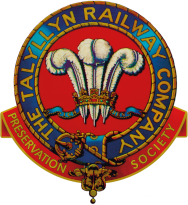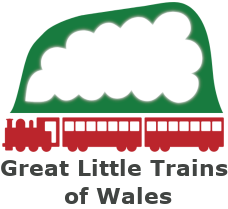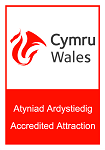MINUTES OF THE 57th ANNUAL GENERAL MEETING OF THE TALYLLYN RAILWAY PRESERVATION SOCIETY
Held at Neuadd Pendre Social Centre, Brook Street, Tywyn, Gwynedd on September 29th, 2007
On the platform were Richard Hope OBE, President, TRPS; Gareth Jones, Chairman, TRPS; Keith Theobald, Chairman, TR Co; Garry Mumford, Hon. Treasurer, TRPS and Accountant, TR Co; John Robinson, Hon. Secretary, TRPS and Secretary, TR Co, and Sue Whitehouse as Minute-taker. There were 180 members present. Richard Hope opened the meeting at 3.30p.m.
1. Apologies
Apologies had been received from Vice-Presidents Alan Holmes, Dai Jones, Winston McCanna, and Jeremy Wilkinson, Council member Ian Lloyd-Owen and eleven other members.
2. Minutes of the 56th AGM
The Minutes of the 56th AGM of the Society, held at Tywyn on September 30th, 2006, having been circulated to members of the Society at that date, were proposed by Richard Hope to be taken as read; this was agreed by a clear majority and he duly signed the minutes as being a true record.
3. Matters arising from the Minutes
Rod Hannah asked for a publication date for the revised TRPS Constitution and Rules. John Robinson expected it to be published within two months.
Russell Prince enquired whether the Business Plan was to be updated at this meeting. Garry Mumford explained that as the plan was only one year in, and as there were to be other presentations at this meeting, the update was planned for 2008.
4. Election of President
Gareth Jones took the Chair and asked the meeting to endorse the Council’s nomination of Richard Hope OBE as President. This was agreed without dissent.
5. Election of Vice-Presidents
Richard Hope resumed the Chair and put to the meeting the nomination of Christopher Awdry as Vice-President, mentioning Christopher’s crucial role in the dispute over the right to use Skarloey Railway names on our locomotives, and also his substantial contribution to the Railway’s finances. Christopher was duly elected, securing the required two-thirds majority.
The nomination of David Mitchell as Vice-President was then put to the meeting, noting his eight years as Managing Director of the TR Co and his retirement from TRPS Council and TR Co Board; he was elected unanimously.
6. Appointment of Independent Examiners
The appointment of Silver & Co as the Society’s Independent Examiners was proposed by Don Newing, seconded by Jane Garvey and agreed by the meeting.
7. Election of Honorary Treasurer
Garry Mumford had been nominated in accordance with the rules, this was put to the meeting by Richard Hope and agreed without dissent.
8. Election of eight members of Council
John Robinson read out the names of the ten candidates and asked them to stand; amid the usual theatrical groans, they did so. Ballot papers were then collected. Later in the meeting Peter Silver, after asking Messrs Cottrell and Newing if they required a recount, announced the election results: 206 papers had been returned with one spoilt, 1325 votes being cast as follows: Paul Cottrell 119, Walter Crowe 134, Jane Garvey 153, Simon Jenkins 162, Jonathan Mann 136, Don Newing 117, Chris Price 158, Andrew Vick 127, Matthew Wear 93 and Noel Williams 126. Mrs Garvey and Messrs Cottrell, Crowe, Jenkins, Mann, Price, Vick and Williams were declared elected. Richard Hope thanked Peter Silver for his work as Independent Examiner and as returning officer at this election, and Peter thanked the meeting for its show of confidence. Permission was given to destroy the ballot papers in the customary manner.
9. Reception, Approval and Adoption of Reports
Richard Hope invited Gareth Jones to present the report of Council. To the printed report in the September Talyllyn News, Gareth added comments on the retirement this year of Managing Director David Mitchell, Traffic Manager David Leech and Facilities Manager Ed Lund, all of whom had long and distinguished careers in both Society and Company. As Gareth expressed the Society’s thanks there was spontaneous applause. Gareth welcomed Larry Bridges to his first AGM as General Manager, and then drew attention to the return to traffic of No 1 Talyllyn, thanks to a small band of dedicated staff and volunteers (Gareth said he would be delighted to see it black, and then corrected himself to “back”) and to a memorable performance by one individual at last year’s AGM evening entertainment. Some new ideas were being worked on: Steve Martin’s professional marketing skills combined with the re-structuring of the Marketing Committee had resulted in a new Marketing Plan, showing that the skills of individual members can still help the Railway; a Liaison Officer had replaced the Shop and Catering Committee for an experimental period, and the Strategic Planning Group had given specific attention to the Railway’s management structure. Council was looking at the future of the coaching stock, and was aware of a slight gradual decline in membership numbers and of the difficulty in establishing why. Gareth thanked employees and volunteers for all their hard work, especially behind the scenes.
Richard Hope asked Larry Bridges for an update on the current year. Amid applause Larry compared the Talyllyn’s year to that of a midland football club, with three distinct seasons: for the Railway these had been a good spring, an awful summer (due to bad weather) and a better autumn. To its credit, the Railway commanded a reasonable share of the local tourist market in the face of adversity. Public bookings were up 0.3% at 39,561, members’ bookings down 0.8% at 5,691 and passenger journeys down 1.1% at 83,814. Traffic Revenue was down 0.3% at £294,134, catering takings up 0.5% overall and those in the Shop down 4.0% at £102,000. Wedding and special train business was growing; we needed to adapt our product for a changing world, exploring what we can offer in addition to a train ride. We are here to preserve, not live in, the past; if we can crack that we have a great future.
Garry Mumford presented the Financial Statements, feeling less of an impostor than last year when they had been prepared by Colin Roobottom; even with the accounts now fully computerized, however, it had been a bigger job than he at first thought. The appointment of Shirley Washbrook had made a big difference, enabling a significant amount of day-to-day administration to be done at Wharf, and the Accountant to concentrate on things that added value. This year had seen substantial progress, but Garry paid tribute to Peter Austin, David Mitchell and Colin Roobottom, who, despite his best efforts, had not been able to shed all his tasks. The Railway Company was still making a loss overall, but less than it might; in 2006 a fare increase and a profit in the catering operation had been helpful, and we continued to derive benefit from members’ loans. The Society had benefited from a legacy and the impact of the subscription increase agreed in 2005; its subsidy to the Company had been smaller than its total surplus over the year. Talyllyn Holdings had received the proceeds of the sale of the late John Slater’s cottage. Bob Morland had taken over the administration of Gift Aid from Michael Howard, and Garry expressed thanks to both; it was hoped members would use the green form inserted in the September News to make regular donations enhanced by Gift Aid.
Questions were invited on the reports and accounts, and questioners reminded to announce their names. Don Newing asked if those already donating by standing order should complete the green form; Garry replied that they should if possible. Bob Morland reported the receipt of over £12,000 in reclaimed tax from Gift Aid.
Richard Hope proposed the adoption of the Report of Council and the Financial Statements of the Society for the year ended 31st January, 2007; this was agreed without dissent.
10. Presentation on proposed management structure changes.
Garry Mumford, using a computer and projector, explained the proposals, emphasizing that they were subject to review. The Strategic Planning Group had been looking at present structures and how they interfaced with the appointment of a General Manager: how can we be more effective and reactive to circumstances? To avoid “loneliness at the top” the General Manager needed support, and a more inclusive, transparent and effective structure was better suited to modern business. It was proposed that an executive committee, meeting monthly, maybe electronically, should share some of the Board’s responsibilities and oversee the implementation and delivery of policies and the Business Plan. It would comprise the three Council-appointed Directors, the General Manager, Secretary and Accountant, the Chairman and Vice-Chairman of Council and one other member appointed by, but not necessarily from, Council. The general objective was to increase Society control of decisions, and to improve transparency, communication and the speed of decision making.
Walter Crowe enquired how the Board’s role would change, and Mike Green was about to ask the same. Garry expressed the hope that the Board meetings would become less critical, as the executive committee would become the day-to-day agent. The Board would still have an important role but it was hoped that its agenda would shorten. Colin Wroblewski asked if we were to see a more regular output report in the Talyllyn News; Garry hoped that we should, but cautioned that the News was a public document to which not everything was appropriate. Richard Hope thanked Garry for a slick presentation and the meeting applauded.
11. Presentation on marketing the Railway
Introduced by Lis Mann, Steve Martin, also using a computer and projector, began by stating a revised objective from last year; an additional 1,000 passengers per year for 5 years was held to be too simplistic, it was actually easier to increase the spending per head. Shown by the passenger survey, our big marketing asset was our friendliness. 98% of visitors would recommend the TR to friends. Marketing involves the product (the Railway) and the promotion of the product. Customer engagement (informing and educating about the fun and friendliness) needs optimizing. A Product Enhancement Group (Lis Mann, Steve Martin, Keith Theobald and others to be appointed) was to plan, prioritize, cost, resource and implement future directions. Investment in promotion must be modest by modern standards; the paper timetable would remain the mainstay, but online promotions needed updating and use of the press and other media must be maximized. A paid Marketing Officer would be needed. Steve concluded that the Talyllyn Railway was a fantastic brand.
Richard Hope, thanking him, invited Steve and Lis to take questions. Chris Price pointed out that 45% of survey respondents were new visitors so the effects of improved marketing were already apparent. He congratulated Steve and the team and suggested that critics of the plan were mistaken. Karen Higginson wondered if an article would appear in the News outlining how every individual could help; Lis said it would, after more work on the plan; every member could help in some way. Steve commented that anyone could get publicity, but the best publicity came from being aware of what we were delivering. Jane Garvey asked how soon a Marketing Officer appointment was to be made, and was assured an announcement would follow in a few days.
Audrey Hope observed that the web address did not include the word “railway”; Lis replied that googling “Talyllyn Railway” led straight to www.talyllyn.co.uk, but Colin Wroblewski asked whether the domain “talyllynrailway.co.uk” was also registered. It was not. Gerry Young stressed the need for that name to be registered to prevent misuse, while Chris Price questioned the need for that on the grounds that people looking for the lake would also be led to the Railway. Richard Hope asked if this counted as phishing. Ed Castellan observed that a greater issue was how to promote the website so that those unaware of the TR could find it. Chris Price stated that googling “railways in Wales” led enquirers to the Fairbourne before the Talyllyn; Mr Castellan rested his case. Jonathan Mann suggested the registration of all likely domain names, but John Robinson warned that there were costs involved.
David Mitchell advertised the new promotion “Talyllyn Treats”, noting the 89 days left till Christmas. George Gardiner queried the value of the calendar as a marketing tool, asking, if it were held to be important, why it was not available earlier. Richard Hope, consulting his list of anticipated awkward questions, cited production difficulties, and Bob Cambridge informed the meeting of the availability of calendars in the hall afterwards.
Walter Crowe wondered why the TR had no online shop; David Mitchell assured him that one was planned, but Chris Price complained that they were not cost effective. Walter encouraged a trial operation by way of a marketing tool.
12. Miscellaneous announcements
As the time approached 1700, when he would need to leave to catch a train home, John Cox thanked the Society for all its support after the death of Janet, referring to the TRPS as a great family.
Richard Hope announced that this year’s collection would be aimed at the purchase of a petrol-driven tamper, displayed on the stage. Dave Scotson explained that Kango tampers were now obsolete, but this latest model would help to clear the backlog of work deferred due to Wharf redevelopment. Collectors circulated with buckets and spare Gift Aid envelopes. The collection (including sums raised at the evening entertainment) amounted to £1,616, which should rise to £2,030 with the reclaimed tax, more than the £1,830 cost of the tamper.
On behalf of the Society, John Smallwood presented Ed Lund,in addition to the camcorder he had received at his party the previous evening, a book on the Darjeeling Himalaya Railway, to replace a copy allegedly stained by red wine, and a copy of a film produced by John, Peter Leppard and Ed of a 1982 railway trip to Austria. Ed thanked everybody for their generosity.
Justin Adams announced the result of the Traffic & Operating Committee election: Traffic Department: Walter Crowe, Lawrence Garvey, Sam Rowbotham and Matthew Wear had been the only nominees for four places so there was no poll; Locomotive Department: Paul Cottrell 66, Martin Fuller 70, Richard Garvey 51, Bill Heynes 59 and Andrew Thomas 26. He declared Messrs Cottrell, Crowe, Fuller, Lawrence Garvey, Richard Garvey, Heynes, Rowbotham and Wear elected.
Philip Sayers followed with the results of the Young Members’ Group election: 39 valid papers and three spoilt had been returned with 178 votes cast as follows: Phil Eaton 37, Chris Palmer 25, Sam Rowbotham 8, Debs Sharpe 21, Andrew Simner 6, Kathryn Smith 26, Marc Smith 22, Andrew Thomas 5, Jon Young 28. He declared Miss Smith and Messrs Eaton, Palmer, Smith and Young elected. Permission was given for destruction of the ballot papers as usual.
Gareth Jones appealed for members’ help at the Warley Model Railway exhibition in December.
Tony Randall announced the Steampipes evening on 5th December and the London Area Group Christmas dinner on 3rd December.
Keith Theobald made a plea for more hands during Outdoor weeks.
Roger Whitehouse advertised a secondhand bookstall at the back of the hall.
Noel Williams reported that the ‘Talyllyn Tote’ continued to raise about £1,600 per annum for the Society and invited the platform party to draw the October Tote numbers; principal winner was Mr J.R. Fenton.
Dave Scotson announced that all six steam locos would be in steam at Pendre after the meeting.
14. Other Business
Richard Hope owned that he had recently had a dream that there were only three people in the hall for this occasion, and speculated which three they might have been. Chris Price, tossing aside comparisons between the Society’s President and Dr Martin Luther King, Jr. congratulated the platform party on an AGM in which the membership had been told what it needed to know.
Andrew Wilson looked forward to a report in the Talyllyn News of some Council consideration of the problem of falling membership numbers.
Ian Howitt offered an apology for his presence and for having nothing to raise under any other business.
Mike Green asked that in future the dimensions of the annual membership card be tailored to fit the kind of wallet given away free by banks and travel undertakings. Jane Garvey agreed to arrange it.
Further advertisements were made for merchandise on tables at the back of the room, and for members’ “Have-a-Go” opportunities the next day.
Chris Price attempted to make sure the meeting went on for over two hours regardless of content but Richard Hope overruled him and closed the meeting punctually at 17.30.








